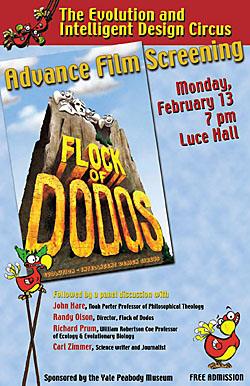 | The new documentary film "Flock of Dodos: The Evolution-Intelligent Design Circus" will have an advance screening on Monday, Feb. 13, at 7 p.m. in Luce Hall, 34 Hillhouse Ave. |
The evolution vs. intelligent design controversy will be examined in a film screening and panel discussion on Monday, Feb. 13, sponsored by Yale's Peabody Museum of Natural History.
A new documentary film titled "Flock of Dodos: The Evolution-Intelligent Design Circus" will be screened at 7 p.m. in Luce Hall, 34 Hillhouse Ave. Seating is limited.
The film takes a new angle in its exploration of the conflict over public school science standards in Kansas and Dover, Pennsylvania, by focusing on tactics and which side is winning or losing the public relations battle.
Following the 84-minute movie, there will be a panel discussion moderated by Michael J. Donoghue, director of the Peabody Museum and the G. Evelyn Hutchinson Professor of Ecology and Evolutionary Biology. The speakers will be "Flock of Dodos" director Randy Olson; John Hare, the Noah Porter Professor of Philosophical Theology at the Divinity School; Richard Prum, the William Robertson Coe Professor of Ecology and Evolutionary Biology and Peabody Museum curator of vertebrate zoology; and Carl Zimmer, science writer and winner of the American Association for the Advancement of Science's 2004 Science Journalism Award.
Olson, a filmmaker and marine biologist who hails from Kansas, believes that mainstream science is losing the fight for public opinion because most scientists aren't adept at public relations. Using the dodo as a metaphor, he warns that scientists "are running the risk of extinction" because the conservatives are way ahead of them in understanding the media and how it operates.
In the documentary, Olson shows how tactics employed by intelligent design proponents make the concept attractive to people. Academics and environmentalists, according to Olson, "don't understand the fact that we live in a society where the facts alone are not sufficient. Science absolutely requires two elements -- you do the science and then you communicate it. Science really neglects the communications side."
T H I S
Film explores evolution vs. intelligent design W E E K ' S
W E E K ' S S T O R I E S
S T O R I E S![]()
 Summer program will send students to Singapore
Summer program will send students to Singapore![]()
![]()
 Scientists say sediment layer may forecast greatest earthquakes
Scientists say sediment layer may forecast greatest earthquakes![]()
![]()
 Yale receives $5.4 million NIH grant . . .
Yale receives $5.4 million NIH grant . . .![]()
![]()
 Trips to Afghanistan kindle student's love of parents' homeland
Trips to Afghanistan kindle student's love of parents' homeland![]()
![]()
 'How many deaths? ... How many injuries?'
'How many deaths? ... How many injuries?'![]()
![]()
 Yale composer is elected the president of scholarly academy
Yale composer is elected the president of scholarly academy![]()
![]()
 ENDOWED PROFESSORSHIPS
ENDOWED PROFESSORSHIPS
 Dirk Bergemann is appointed . . . Campbell Professor of Economics
Dirk Bergemann is appointed . . . Campbell Professor of Economics![]()
 Philip Haile is named the Ford Foundation Professor of Economics
Philip Haile is named the Ford Foundation Professor of Economics![]()
 Urry designated the Israel Munson Professor of Physics and Astronomy
Urry designated the Israel Munson Professor of Physics and Astronomy![]()
 Warner is named the Avalon Professor of the History of Medicine
Warner is named the Avalon Professor of the History of Medicine![]()
![]()
 Symposium pays tribute to noted architect Philip Johnson
Symposium pays tribute to noted architect Philip Johnson![]()
![]()
 Film explores evolution vs. intelligent design
Film explores evolution vs. intelligent design![]()
![]()
 Yale affiliates to be among featured guests at LEAP fundraising dinner
Yale affiliates to be among featured guests at LEAP fundraising dinner![]()
![]()
 New test uses amniotic fluid to predict possibility of premature birth
New test uses amniotic fluid to predict possibility of premature birth![]()
![]()
 Sex of fetus shown to affect severity of symptoms in women with asthma
Sex of fetus shown to affect severity of symptoms in women with asthma![]()
![]()
 Analyzing proteins in urine can help diagnose, classify preeclampsia'
Analyzing proteins in urine can help diagnose, classify preeclampsia'![]()
![]()
 Exhibit, symposium focus on two 'Witnesses to War and Revolution'
Exhibit, symposium focus on two 'Witnesses to War and Revolution'![]()
![]()
 The 60-year history of the United Nations is celebrated in new library exhibit
The 60-year history of the United Nations is celebrated in new library exhibit![]()
![]()
 Expert on global environmental issues named Distinguished Visiting Fellow
Expert on global environmental issues named Distinguished Visiting Fellow![]()
![]()
 Issues of chronic illness explored in international conference
Issues of chronic illness explored in international conference![]()
![]()
 Readings celebrate 'London's River' in verse and prose
Readings celebrate 'London's River' in verse and prose![]()
![]()
 Campus Notes
Campus Notes![]()
Bulletin Home |
| Visiting on Campus
Visiting on Campus |
| Calendar of Events
Calendar of Events |
| In the News
In the News![]()
Bulletin Board |
| Classified Ads
Classified Ads |
| Search Archives
Search Archives |
| Deadlines
Deadlines![]()
Bulletin Staff |
| Public Affairs
Public Affairs |
| News Releases
News Releases |
| E-Mail Us
E-Mail Us |
| Yale Home
Yale Home